Children's petting farms face tough new rules

Your support helps us to tell the story
From reproductive rights to climate change to Big Tech, The Independent is on the ground when the story is developing. Whether it's investigating the financials of Elon Musk's pro-Trump PAC or producing our latest documentary, 'The A Word', which shines a light on the American women fighting for reproductive rights, we know how important it is to parse out the facts from the messaging.
At such a critical moment in US history, we need reporters on the ground. Your donation allows us to keep sending journalists to speak to both sides of the story.
The Independent is trusted by Americans across the entire political spectrum. And unlike many other quality news outlets, we choose not to lock Americans out of our reporting and analysis with paywalls. We believe quality journalism should be available to everyone, paid for by those who can afford it.
Your support makes all the difference.There should be no ban on children petting animals on farms but more must be done to protect them from infection, an inquiry has concluded.
Despite a catalogue of failings that led to Britain's biggest farm outbreak of E. coli last summer, affecting 93 people – most of whom were children – a ban on petting farms would be "draconian", said Professor George Griffin, chair of the inquiry.
It should be for parents to choose whether to let their children pet the animals, but they must be properly informed about the risks and the farms must be properly regulated, he said.
Launching his report into the outbreak at Godstone Farm, Surrey, in August and September 2009 – which led to 27 people being taken to hospital – Professor Griffin said it could "very likely have been avoided" if more attention had been paid to preventing visitors becoming contaminated with animal faeces.
Petting animals – especially "ruminant" species such as cows, sheep and goats – carried risks of infection with E. coli but these could be minimised with proper handwashing, close supervision and measures such as frequent changes of straw bedding for the animals, he said.
The layout and design of farms was crucial to ensure contamination was kept to a minimum, the report found. Signs should spell out the dangers, hot and cold water with soap should be available, and animal feed should not be sold in paper bags, which split easily, spilling the contents and tempting children to retrieve them.
Professor Griffin said: "It is absolute common sense. There are no bans, and no new licensing requirements [in our report] but we are recommending a common framework of standards that protect the public."
He said he had been "outraged" by reports at the weekend suggesting that the 250-page document would call for a ban on contact with farm animals.
"We are not recommending draconian over-regulation at all. We hope our recommendations will enhance open farms as safe places to visit," he said.
An estimated five million people visit open farms each year, a number which is increasing as farms diversify. At the height of summer, Godstone Farm attracted 2,000 visitor a day.
The report identifies failures at every level, including by the Health Protection Agency, which commissioned it, to prevent another instance of the outbreak, which occurred over the August bank holiday in 2009.
Of the 93 people affected, 76 were aged under 10. The worst affected were 17 children who developed haemolytic ureamic syndrome, a life-threatening condition that damages the kidneys. Eight of them required dialysis, and at one stage all of the kidney failure services available in London were occupied by children affected by the outbreak. Some children have been left with permanent damage and may require kidney transplants later in life.
Two thirds of the cases could have been avoided had the petting barn been closed on the Friday before the bank holiday, when four cases had already been identified. Instead, it stayed open for another week – by which time a further 60 people had been infected. The report called this delay "unacceptable".
Among 43 recommendations, Professor Griffin highlighted six designed to raise public awareness, improve regulation and speed British assessment of a vaccine against E. coli already given to animals in the US. Emphasising his resistance to a ban on petting at the farms, he said it was "perfectly possible" to minimise exposure to animal faeces. "If you took [that argument] to its logical extent you would stop people walking in the country," he said.
Paul Bettison, chairman of Local Authorities Coordinators of Regulatory Services, said: "The important thing now is to establish the right middle ground between enjoyment and safety for millions of children."
Jackie Flaherty, the owner of Godstone Farm, welcomed the report and called for a framework of "reasonable practical measures" to protect visitors.
The farm has stopped allowing children to pet cows, sheep and goats but still permits them to pet pigs and horses, which have a lower risk of transmitting E. coli.
Join our commenting forum
Join thought-provoking conversations, follow other Independent readers and see their replies
Comments